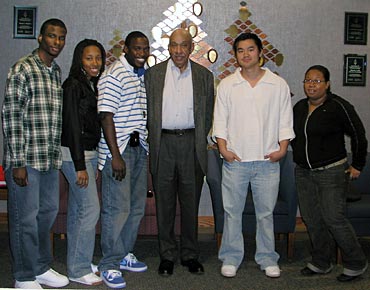Behavioral scientist recalls campus climate of the ’50s
Students of color are not much different today than they were 50 years ago, behavioral neuroscientist Leslie H. Hicks told a group of PEOPLE undergraduates during an informal question-and-answer session about college life.

Prominent neuroscientist and UW–Madison alumnus Leslie Hicks stands with PEOPLE College Scholars prior to a talk he gave on human behavior and students of color in a university setting over 2007 spring commemcement weekend.
Hicks was back on campus, where he earned his Ph.D. (1954) and M.A. (1952) under Harry F. Harlow, to receive an honorary degree during commencement weekend May 18-20. He was one of the first African Americans to earn a Ph.D. in behavioral neuroscience and founder of the first doctoral program in clinical psychology at Howard University.
“I don’t know that there’s much of a difference in the abilities,” he says of today’s students compared to when he was enrolled at the university. “Keep on doing what you did the last 12 years and you’ll be fine.”
He recalled hanging out in the Rathskeller at an informally designated table for psychology students called Neurotic Nook and hitting a spot called the Green Lantern back in the 1950s. Both were places of integration, albeit for a much smaller number of black students on campus at the time.
“We weren’t as organized back then. There wasn’t a PEOPLE program or a Black Student Union,” he says, referencing two of the many multicultural programs and student organizations supported by the campus today. “But we didn’t have much of a problem adjusting to academic or social life here.”
During his 53 years at Howard University, Hicks has taught generations of undergraduate and graduate students about the brain and behavior, and is the recipient of several lifetime achievement awards. His long and distinguished career has produced publications about biological, developmental, clinical and social psychology. He also is widely known for advancing the discipline of African American Studies and championing diversity in science.
Hicks spent time as an exchange scientist in Moscow, an administrative officer at the American Psychological Association, a fellow at UCLA’s Brain Research Institute and a fellow at Stanford’s Center for Advanced Study in the Behavioral Sciences.
“We were grateful for this opportunity to have such a prominent scholar share his life journey with our students, especially in relation to entering the science field,” says Jacqueline A. DeWalt, director of the PEOPLE program.
Questions for the neuroscientist ranged from what got him interested in studying human behavior to how the brain learns to the effect emotion has on memory. Students were also curious about the differences in human behavior on a predominantly white campus such as the UW and a historically black college such as Howard.
“Some of the fraternities make more noise on Friday night at Howard. When they do stepping, those guys can really bark,” Hicks says.
Tags: diversity
